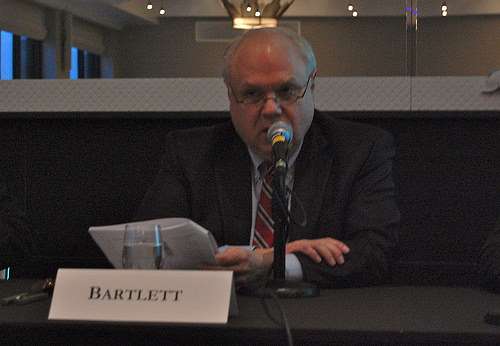Economists: Breaching the Debt Ceiling "Uncharted," But "Not…a Catastrophe"


Note: This article has been updated to include a reply from economist Jeffrey Miron.
Apocalyptic talk flies around about the consequences of breaching the debt ceiling—that is, letting the federal government run out its borrowing authority and failing to let it run up the credit cards any further. Establishment figures warn that, with the goverment spending far more than it takes in in the form of tax revenues, the leviathan on the Potomac will not only be unable to pay its bills if the debt ceiling isn't raised, but that it could default on payments on its existing debt and cause an international financial crisis. Not incidentally, that would raise the price of future borrowing to the U.S. as the federal government became a higher-risk customer. President Obama claims "every economist out there is saying" that "millions of Americans—not just federal workers—everybody faces real economic hardship" if the debt ceiling isn't raised.
But, is it true? Does every economist out there see doom if the debt ceiling isn't raised?
To find out, Reason approached several prominent economists and asked them a simple question: Reason Magazine is doing a piece on the debt ceiling, and we were wondering what your take is on the consequences of breaching it? Will it be a catastrophe or not? We've already mentioned Nobel Prize-winner Vernon Smith's answer, but he wasn't the only one to chime in, nor was he the only one to see a potential upside to keeping the debt ceiling where it is.

Bruce Bartlett is a one-time Ron Paul staffer who went on to become Vice chairman of the Joint Economic Committee of Congress under President Reagan and a senior policy analyst for President Bush the first. He's since become something of a Keynesian and refers on his Twitter feed to fiscal hawks as "wankers." About the debt ceiling he told Reason, "I have no idea. I think we are entering uncharted waters and only a fool would do such a thing."
Short and pithy and unenthusiastic about leaving the debt ceiling unhiked—but not really a prognostication of doom.

Greg Mankiw, Chairman of the Council of Economics under President Bush, the second, and now chairman of the Department of Economics at Harvard University, agrees about the degree of uncertainty inherent in breaching the debt ceiling.
"It is hard to say for sure, as it is largely uncharted territory. My sense is that if the Treasury prioritizes debt service over other spending, then the bond market should not fear default on government bonds. However, the administration has asserted that such prioritization is impossible, which strikes me as implausible.
The one clear risk is that the sudden reduction in government spending could contract aggregate demand and push the economy into recession."

By contrast, Vernon Smith, professor of economics at Chapman University's Argyros School of Business, and 2002 co-winner of the Nobel Prize in Economics, takes the prospect of a frozen debt ceiling, and even a debt default, in stride.
"No, it will not be a catastrophe. The U.S. is one of the few countries in the world and in history that has NOT defaulted on its debt; consequently we suffer the consequences of the curse of a reserve currency. The great housing-mortgage market bubble, 1997-2006, was fueled by a massive inflow of foreign investment funds. This is the other side of our deficit on trade account which looks like a sweet deal in which foreigners send us more goods and services value than we send them. But it has negative consequences and cannot be sustained indefinitely."
By Smith's take, making the United States less attractive as a destination for foreign investment might spare us future bubbles, and so have an upside.

Also seeing a silver lining in the debt-ceiling cloud is Lawrence H. White, a former visiting scholar at the Federal Reserve Bank of Atlanta, professor of economics at George Mason University, and a member of the Mercatus Center Financial Markets Working Group. Like Mankiw, he points out that the federal government can still service debt even without a hike in the debt ceiling. He also suggests that a freeze of further borrowing might be what it takes to force the federal government to reduce spending.
"Reaching the debt ceiling does not imply default on 'full faith and credit' Treasury debt, because the Treasury has more than enough income to make the interest payments due on the debt. But it does imply that other spending will have to be cut in order to pay the interest due on existing debt without borrowing more. I'm in favor of reducing that other spending, so that result doesn't strike me as a catastrophe."

The one economist who spoke to Reason and is willing to invoke the "C" word is Harvard University's Jeffrey Miron. A Senior Lecturer and Director of Undergraduate Studies in the Department of Economics at Harvard University, and a senior fellow at the Cato Institute, Miron says there is no reason that hitting the debt ceiling necessarily means defaulting on the debt—the government has option to avoid that. He fears, though, that poor management could lead to disruptive effects. He warns, too, that while there are few good paths to shrinking gvernment and eliminating bad policy, standing firm on the debt ceiling is unlikely to be the exception.
"I think there's a moderate to good chance it'll be a catastrophe. 'Catastrophe' is bit strong, but there's a moderate to good chance it'll be extremely disruptive and costly, in part because of the way people handle it. That said, there are certainly things they could do in the short term to manage it even if we hit the debt ceiling. For example, we could prioritize which payments we make. Every single day, we're paying interest or credit orders, social security checks, salaries of government employees, on and on and on. We have more than enough revenue to keep paying the interest payments, the explicit debts. People equate getting to the debt ceiling with default- that's not right. It doesn't necessarily have to happen this way. We could send people to whom the government owes money IOUs, and if people believe those IOUs will be paid within 6 weeks or a month that doesn't necessarily have to be so disruptive. We could tell everyone, we're only give you 90 cents on the dollar and we'll give you IOUs for the rest. The benevolent libertarian might say, well, what are the really stupid things the government spends money on, let's cut those because they're bad for the economy anyway. It is certain to be disruptive, asset markers are likely to react quite negatively. It's certainly something we want to avoid.
I understand why people who are thoughtful advocates of small government see it as, we don't have any clout left to reduce government. Hanging tough on the debt ceiling is the only arrow left in the quiver. So even though it might be disruptive, we have to play it. My heart says it won't work out that way. If we end up having some disruptive effects, the history of government policy is that in bad times we create more bad policy. You're not going to get rid of existing bad government policies. So, I think it's not the most effective way of shrinking government, meanwhile understanding that it's hard to shrink government.
So…There you have it. Breaching the debt ceiling is a venture into uncharted territory with uncertain consequences. It may well have a downside and even be foolish—with a chance of "disruptive effects." But there is a potential for beneficial outcomes, too, if failing to hike borrowing limit reduces the likelihood of future bubbles and forces reductions in federal spending.
Editor's Note: As of February 29, 2024, commenting privileges on reason.com posts are limited to Reason Plus subscribers. Past commenters are grandfathered in for a temporary period. Subscribe here to preserve your ability to comment. Your Reason Plus subscription also gives you an ad-free version of reason.com, along with full access to the digital edition and archives of Reason magazine. We request that comments be civil and on-topic. We do not moderate or assume any responsibility for comments, which are owned by the readers who post them. Comments do not represent the views of reason.com or Reason Foundation. We reserve the right to delete any comment and ban commenters for any reason at any time. Comments may only be edited within 5 minutes of posting. Report abuses.
Please to post comments


The only way we could default in the near term is if the administration (esp. the Treasury) decided to intentionally default. Our revenues could cover the debt servicing for now.
Of course, if spending were cut. . . .
heresy!
Eventually there will be a default, either a hyperinflationary default, effectively wiping out the debt by destroying the currency, or an actual default. Either way, I do NOT want my $ in US related assets or a US financial institution when that happens in the next few years.
The best mitigation is to place your $ in good, solid foreign financial institutions in solid, stable, currencies in countries that are not banana republics, and not too connected to the USA, or investments in similar environments.
US Banks and brokerage firms will go down, no matter what or where their holdings are. I do not want to wait and see if I get any money/assets back.
swisssolution.webs.com
"The best mitigation is to place your $ in good, solid foreign financial institutions in solid, stable, currencies in countries that are not banana republics, and not too connected to the USA, or investments in similar environments."
No such thing, even the countries which are not terribly tied to the US economically are tied to other countries which are, when the US defaults every country on the planet will see their economies collapse, even worse than the US's does.
If you are actually worried about a fiscal collapse you should hold assets in real properties,stock of utility and oil companies, etc.
Whatever comes out of the collapse those types of assets will hold the largest percentages of their value however they still are not safe as there is always the risk of nationalization.
LOL With folks like you in mind, the Prgressives dreamed up the FATCA law which makes it nearly impossible, or at least highly difficult, for regular Americans to open up foreign bank accounts and investments. They've gotta catch all the tax cheats you see?
Are you actually suggesting that the Feds might do something silly and unnecessary just to (try to) prove that they're existence is a requirement for our lives to continue without great suffering?
Oh! No, no, no, no, no, no, no
yes
Um, yes.
nudge, nudge, tap, tap, wink, wink, say no more, squire.
I'm going to give myself a pre-pat-on-the-back and claim to be the only bloke to catch this reference.
Nod's the same as a wink to a blind man ...
http://www.youtube.com/watch?v=4Kwh3R0YjuQ
"blind bat"
And it's
"Nod's as good as a wink"
"The only way we could default in the near term"
Hasn't the government already defaulted? Are there not government employees and contractors that are owed money and haven't been paid?
Default on our debt obligations. Frankly, not paying employees and contractors is about the same kind of screwing we all get from this government.
this
What ever happened to the Tea Party? They got their beginning by protesting too big to fail and TARP etc. Now apparently a debt obligation is only a debt obligation if it's owed to US debt holders, ie those deemed too big to fail.
That has nothing at all to do with the Tea Party. If you don't like it, take it up with the Supreme Court.
You really expect the SC to get involved in this?
What amazes me is the witless reiteration of blatantly false talking points throughout the media. No, its not a government shutdown. No, hitting the debt ceiling is not a default.
Nearly every commentator on this is either (a) a willing and enthusiastic liar or (b) too stupid to have a microphone in front of them. I don't see any other alternatives.
Re: R C Dean,
It's the second one, RC. I just don't see them being smart enough to be liars.
They're parrots. They just repeat the lies that the actual, better liars come up with. So yes, they are too stupid to have a microphone in front of them, but the problem is, they make sure anyone smart enough to point that out never gets a microphone in front of them.
That is what they are. It is just one big journolist. A few of the smarter ones come up with the acceptable lines of thought and the rest of them go out and repeat the talking points. None of them think or do much of anything for themselves.
I learned early on the fundamental truth = "Journalists are lazy". That's it. That's all it is, and, with VERY few exceptions, it's universally true.
They're lazy, they don't want to do any more than they have to. Local schlock paper up to...whatever one considers the "height" of journalizm - it's true.
Ever been misquoted in the press? Oh, only EVERY time? Yeah, that's why...
They really are. One of the more laughably ironic talking points ever put out was how Bush or other Republicans are not "intellectually curious". This charge levied by a group of people who make no effort to understand any of the various topics they cover.
So...projection yet again, then. Amazing how persistent that is.
Yeah, the Suder-Man scored a coup by having enough wherewithal to actually call Obamacare guy's dad. How many hacks were just happy to take what they were spoon-fed?
They will believe anything if it fits their ideology. I have lost count of the number of times people have trolled the major media simply by telling them a story they want to believe. If the media wants your story to be true, there is little danger of them checking it out before they publish it.
Didn't one organization put 5 fact checkers on Palin's trail at one point?
But only one of the tens of thousands of journolists out there bothered to pick up the phone and call the one guy that claimed to buy insurance from the exchange
Didn't one organization put 5 fact checkers on Palin's trail at one point?
But only one of the tens of thousands of journolists out there bothered to pick up the phone and call the one guy that claimed to buy insurance from the exchange
Bingo - Exhibit A. Suderman is a 1%er! Of Journalists....maybe more like 0.001%....
it's less about being lazy and more about being part of the herd. No one wants to be the person saying one thing while everyone else is saying the other. It speaks to the heart of the attacks on fox/talk radio/non-MSM outlets. They have deviated from the herd and that cannot be tolerated.
Yeah, this. I almost spewed my Cheerios? this AM when my (usually decent, independent thinking) local radio new guys barfed out the "default" talking points as "news" all of a piece.
Screamed at the radio, but it didn't do any good...."IF WE SERVICE THE DEBT, WE'RE NOT IN DEFAULT!" Yeah, grandma may not get her SSN, but that's another issue...it ain't default.
This is false. The US is no less legally required to pay its other obligations than it is interest on debt. A default is a default.
The real question is what the fuck is your point? For what purpose are we risking probable global recession?
To crash the fucker in the meager hope that the resulting carnage will make us all strict Constitutionalists in the rebuild. It seems to be inevitable so let's get it on.
Well at least you're being honest.
You'll understand if the rest of us don't think global recession is worth the price of the lovely prize of handing the reins of civilization over to people who would deliberately cause one for political ends.
Be careful about how many of "the rest of us" you think there really are.
Apparently the SecTreas testified that treasury instruments rely on continuous rollover in order to be paid on time. He essentially described a Ponzi scheme without those words.
That's right. And rolling over debt consists of replacing current debt with new debt. Rolling over debt doesn't implicate the debt ceiling at all. If he was implying that he can't roll over existing debt without an increase in the debt ceiling, then he is a liar.
I don't want to link to a CNS report, which is where I read it, but he basically said that they don't pay debt out of revenue at all and implied that they can't make the switch to doing so. That strikes me as something that is either totally wrong or should be totally wrong if it's not, but I don't know.
At any rate, if they depend on rollover to pay current debt then the rollover burden has to grow with time because of interest, doesn't it? I could see that breaching the limit.
What's to stop them from just ignoring the law and issuing debt anyway? Seriously. It's not like this administration doesn't already ignore laws that it passes. Why bother to follow this one?
There may be a practical limit there. I would assume there's no guarantee that outlaw debt will be paid back (even more so than normal legitimate debt), and thus not buy any such instrument.
Of course Congress lacks the balls to even not pay for nonessential bureaucrats that are not working during the non shutdown.
Well, imagine if banks gave credit cards to teenagers on the theory that they can get mom and dad to pay the balance despite the fact that they didn't co-sign for the debt.
Wait, they do that all the time, and it often works. So maybe there is no real limit.
I hear the "never defaulted" argument a lot, but weren't there several technical defaults already - at least one in which we issued debt in gold and paid back in dollars?
Yes. See under Nixon Shock.
Nothing. The only problem is that someone has to buy that debt. And investors might conclude that buying debt over which there is a legal cloud might not be a good risk.
Of course the fed can always buy it and print more money.
I wonder what the effect would be if the Fed forgave its Treasury holdings.
That is an interesting question. I suppose those bonds back up the fed actions in other contexts. But off of the top of my head, I can't think of why it would be a disaster.
I assume the major potential consequence would be some sort of bad monetary one, but I don't understand this stuff very well. I look at it mostly as magic.
The only effect I can think that it would have is that it would effectively print more money. But, the fed has been doing that like crazy anyway. I will have to think about it. There has to be some really bad thing that prevents them from just doing that. But it is not obvious what that is.
I mostly ask because I could totally see that happening some time in the future.
It would be highly inflationary as the debt would not be repaid by the treasury.
But it's not like the Fed hasn't been trying to ignite inflation for years now anyway.
My understanding is that the reason the dollar is the reserve currency around the world is because it's the only major currency that has never defaulted. While the Fed forgiving its Treasury holding isn't a default, I think it would still send shudders throughout the world of finance as worldwide investors tried to figure out what to use instead of dollars for trade.
It's the US being the world's hegemon and the petro-dollar effect.
I hear the "never defaulted" argument a lot, but weren't there several technical defaults already - at least one in which we issued debt in gold and paid back in dollars?
At any rate, I wonder if there's a good chance that "Fuck you, that's why" would work in this scenario as well. Where else is there to go yet? I've heard that several countries have started to move away from the dollar but nobody is really there yet. Any country heavily into dollars would be cutting their own throat if they tried to upset the cart before they got out. So I think there's a lot of inertia here that could save the dollar's position from threats that would kill other currencies.
I've wondered what happens if the Fed forgives its Treasuries.
One, the money supply would contract, and their game of suppressing interest rates would be over.
I'm not sure what the accounting actually is on those Treasuries. They might (I really don't know) be part of the capital base of the Fed's member banks in some way. If so, forgiving the Treasuries would contract the capital of the member banks, which would be a Bad Thing (from their perspective).
Those treasuries might be pledged under various kinds of repo agreements, as well, which would delay (at a minimum) forgiving them. If Treasury has a lot of these kinds of pledges or repos out there, it could be a real problem if it loses the ability to deploy its assets that way. Again, a contraction of top-level banking capital assets would be Very Bad.
The nice thing about being the Federal Reserve is that you have an infinite amount of money.
How about a simultaneous forgiving of treasuries while buying new ones?
Because if they do that then they can't blame republicans for the subsequent debt, and blaming republicans is about the only thing these shitheads excel at.
"blaming republicans is about the only thing these shitheads excel at."
I blame Bush
Woah...
That will never happen only because a) we already know that Congress will reach a debt ceiling agreement anyway and b) because we're still in a recession - we have't left the one that started back in 2001, which started back in 1987, which started back in 1980, which actually started back in 1971.
My sense is that if the Treasury prioritizes debt service over other spending, then the bond market should not fear default on government bonds. However, the administration has asserted that such prioritization is impossible, which strikes me as implausible.
Of course it's implausible, but if the administration admitted that there would be no default then fear becomes that much more difficult for them to sow.
Of course if they were actually concerned about the state of the economy, the last thing they would want to do would even hint at default. The fact that they are threatening as much tells you all you need to know about where the well being of the country stands in relation to their short term political advantage.
Shameless. I am continually befuddled at how our "leaders" are able to lie and face no challenges. The MSM is complicit. If this were a GOP administration there would be riots in the streets. I can't imagine what will happen when the government health care system breaks down (oh yeah, that's already reality) and people are turned away at the ER or don't get their reimburesements and the IRS smells the meat. Will the government decide to inflict a little "political pain" by barricading hospitals if a CR isn't passed to it's liking?
Look, this is very simple: It is not like both Congress and the WH do not like to spend someone else's money - they both love it. There will be a debt agreement, count on it.
I fully expect Obama's minions to impose as much pain as possible to punish the country for Obama's sins.
Well, there actually is some truth to the "catastrophic" talk about cutting up the credit card... Catastrophic that is to the reelection prospects of politicians who have made political promises to spend money they don't have. If they can't borrow it, they're fucked. And that would be a catastrophe.... to them.
Point being, you can't default on a political promise to spend money. As much as they argue otherwise, they have no binding obligation to make good on entitlements. Period. Granny might get mad, but not paying her isn't "default" and her credit rating agency isn't all that widely used.
Well, there actually is some truth to the "catastrophic" talk about cutting up the credit card... Catastrophic that is to the reelection prospects of politicians who have made political promises to spend money they don't have. If they can't borrow it, they're fucked. And that would be a catastrophe.... to them.
This is the kind of stupidity I'm seeing everywhere: Republicans Are Awfully Close to Violating the Constitution
Of course OldMexican is correct, and the debt ceiling will be raised. Both sides are too addicted to spending other people's money for anything else to happen. But the level of pure derpitude being created by this issue is incredible.
Only in the world of the liberal media could "the country must honor its debts" come to mean "the Congress must let the President endlessly borrow money.".
Yeah, what they're suggesting is an unchecked executive power to increase the country's debt. Just guessing here, but that's not at all consistent with our form of government.
What they are trying to do is conflate "debt" with "stuff we've already decided to buy." In other words, "We made a political promise to spend money on things and people, so those promises have to be kept." Not the same thing, but most people (i.e. their voters) are too stupid to think about it critically.
Otherwise known as laws.
Bad laws.
If what you're advocating is the undemocratic usurpation of the legitimate governing process in this country, would you mind terribly if you're viewed as the seditionists you are?
Not at all. We hang together or separately like some guys I once read about.
Because this thread seems to be getting the most attention, I wanted to show you guys the new way to masterbate invented by Warty.
http://www.vice.com/read/pool-noodle-girlfriend
PS I note that the credit card in the pic expired in 2001. Heh...
Perhaps that card was used to finance the 9/11 attacks. Well, to pay for the strippers before the attacks.
America died in 2001, too, didn't it?
I haz a sad now 🙁
I wish our credit rating would decline so countries would stop loaning us money. Our credit cards need to be cut up.
So let me see if I get the point here:
Running up the debt is a huge catastrophe, as always pointed out at Reason. Failure to pay it back...not so much?
You really could not make a more ridiculous point.
The whole point is that you don't need to contract more debt in order to pay back the debt you already have, you can pay it back out of existing revenues. If you actually pay more in interest that you take in as revenue, then it's already too late.
No you can't...and that is the whole point that should be evident to all. If you do not increase the debt ceiling you IN FACT CANNOT pay back the money you owe from existing revenues. Someone is not getting paid...interest is not the only debt.
And if debt is bad, the failure to pay it back is worse, along with the subsequent consequences...i.e.: increased interest rates that further add to the debt, future difficulty in borrowing, impact on the private sector investment, foreign investment....all of that will add further to the debt, that supposedly all at Reason believe is a catastrophe...until I guess its time to pay it back, and then for some reason the consequences disappear.
I believe that it is statutized that the interest on the national debt must be paid first, i.e., prioritized.
I was wondering about that today. If it is indeed the truth, then they really are making all oft this up and this whole thing about "default" is a farce.
Just give it up for Christ's sake.
Now yer talkin. Let's give it up. Let's crash the thing. Think of the input you could have remaking us France.
That's exactly what would happen is what you guys don't get. People never voluntarily enact a bare-bones government. They don't like it and they don't want it. This will be viewed nearly universally as caused by the Tea Party Republicans. Which policy direction do you think the people will favor in the aftermath of their destructive antics?
What we do get is the realization that both scenarios result in exactly the same outcome. Unsustainable debt is, well, unsustainable. You seem to at least agree on that much.
Our choices seem to be a serfdom of ever higher taxes and government control of our lives or initiating what is inevitable anyway. I like to consider myself proactive, my rice and ammunition is fairly dry so let's get it on. More of your ilk will be disenfranchised than mine.
"it'll be extremely disruptive and costly, in part because of the way people handle it."
Given how the administration has handled the shutdown, they would make sure to handle the debt situation as to make it as disruptive and costly as possible.
What was your solution to the shutdown, give an extremist few in the Congress all that they demanded?
The economy has to collapse sometime and I think this will accelerate the process (in the long term).
"By Smith's take, making the United States less attractive as a destination for foreign investment might spare us future bubbles, and so have an upside."
What? There will always be bubbles. Always. We will never be spared from them. Whether housing, tech stocks, tulips, etc., at some point, society for some reason will prop up a commodity at prices vastly over what it should be valued at.